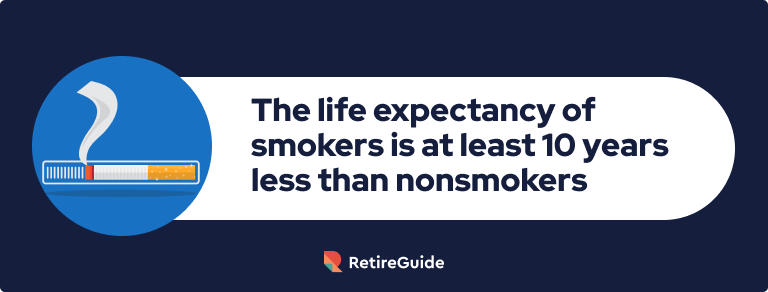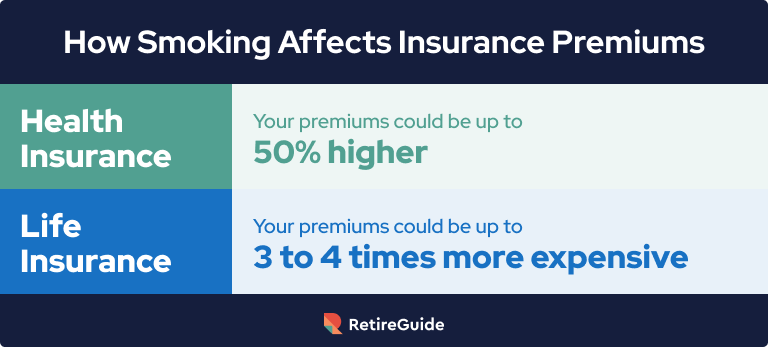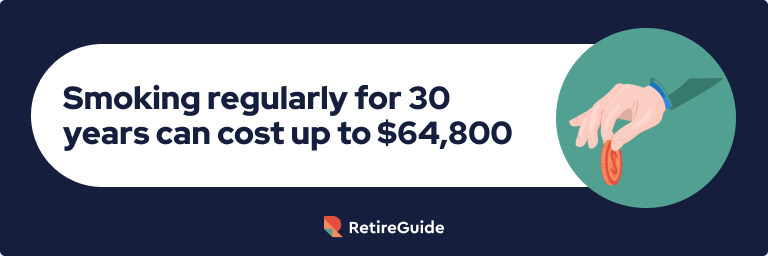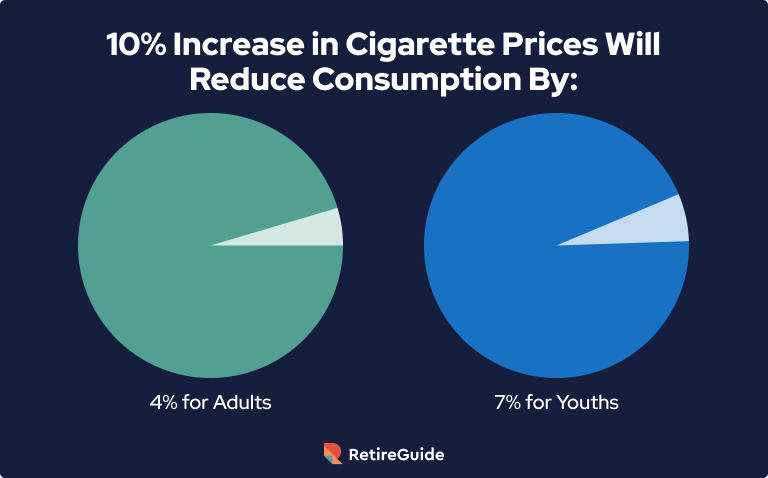Financial Costs of Smoking: Insights Into Expenses and Long-Term Effects
Discover the true financial costs of smoking and its economic impact. Explore the direct expenses, health-related expenses, lost productivity and long-term implications. Quit smoking with the help of our resources and programs, leading to better health and financial decisions in retirement.

- Written by Lindsey Crossmier
Lindsey Crossmier
Financial Writer
Lindsey Crossmier is an accomplished writer with experience working for The Florida Review and Bookstar PR. As a financial writer, she covers Medicare, life insurance and dental insurance topics for RetireGuide. Research-based data drives her work.
Read More- Edited By
Lamia Chowdhury
Lamia Chowdhury
Financial Editor
Lamia Chowdhury is a financial content editor for RetireGuide and has over three years of marketing experience in the finance industry. She has written copy for both digital and print pieces ranging from blogs, radio scripts and search ads to billboards, brochures, mailers and more.
Read More- Reviewed By
Michael Jones
Michael Jones
Medicare Expert and Owner of Grand Anchor Insurance Solutions
Michael Jones is a licensed insurance agent who manages his own agency called Grand Anchor Insurance Solutions. In addition to being a Medicare expert, Michael specializes in other insurance products such as voluntary benefits for employees of businesses.
Read More- Published: August 10, 2023
- Updated: August 21, 2023
- 8 min read time
- This page features 12 Cited Research Articles
Essential Cost of Smoking Statistics
- The Medicaid program spends more than $39.6 billion nationwide in health care costs for smoking-related diseases each year, according to the American Lung Association.
- The average smoker can spend more than $2,000 a year on cigarettes, according to World Population Review.
- For every person who dies because of smoking, at least 30 people live with a serious smoking-related illness, according to the Centers for Disease Control and Prevention (CDC).
- The average retail price of a pack of cigarettes in the U.S. is $7.19.
- As of Jan. 1, 2023, the average state cigarette excise tax is $1.91 per pack. However, state cigarette excise taxes vary, from a low of 17 cents per pack in Missouri to a high of $4.50 per pack in the District of Columbia.
- According to the American Cancer Society, lower smoking rates result in fewer smoking-related cancers, premature deaths, reduced spending on smoking-related health problems and more productive workers.
- The American Cancer Society proposed a $1.00 minimum tax increase per pack of cigarettes and other tobacco products to reduce tobacco consumption.
- The American Lung Association conducted the “State of Tobacco Control” report in 2023, which graded states that prevent and reduce tobacco use with strong control laws. The states with the best grades were California, Maine, Massachusetts and the District of Columbia.
- According to the same report, Alabama, Mississippi, North Carolina and Texas had the worst grades for tobacco control laws and policies.
- The average cigarette taxes of all states and the District of Columbia are $1.91 per pack.
- Smoking costs the U.S. economy over $600 billion in direct health care costs and lost productivity every year, according to the American Lung Association.
- The American Lung Associations advocacy plan proposes that Congress, states, counties and cities must raise the tax on e-cigarettes to level with cigarettes and other tobacco products in 2023.
- New York’s 2024 enacted budget includes an increase in the tax on a pack of cigarettes by $1.00, to $5.35, which is the highest and strongest cigarette tax in the country.
- According to the Annual National Youth Tobacco Study, more than 2.5 million high school and middle school students use e-cigarettes.
- Every 10% increase in the price of cigarettes reduces consumption by about 4% among adults.
Quitting smoking will not only add years onto your life, but save you potentially thousands of dollars each year.Health Costs of Smoking
Smoking shortens your lifespan, increases your insurance costs and can require costly treatments. Quitting smoking can help you build a healthy retirement lifestyle and better distribute your funds.
Smoking also presents life-threatening diseases, regularly causing cancer, heart disease, strokes, lung diseases and chronic obstructive pulmonary disease (COPD). According to the Pan American Health Organization, the life expectancy of smokers is at least 10 years less than nonsmokers.

Brian Clark, BSN, MSNA, Founder of United Medical Education spoke to RetireGuide about the potentially costly procedures that smokers could require. “Smokers may face various medical procedures due to the detrimental effects of smoking on their health.”
Clark provided a list of procedures smokers could face. While some screenings and surgeries can be covered by Medicare, coverage isn’t always guaranteed, or the service could only be partially covered.
Medical Procedures Smokers Could Require- Lung cancer screenings
- Respiratory treatments
- Surgeries for conditions like lung cancer or COPD
- Interventions for cardiovascular issues such as angioplasty or coronary artery bypass surgery
“Smokers may also require ongoing medical management and monitoring to address the potential long-term consequences of smoking on their health,” Clark told RetireGuide.
Impact of Smoking on Insurance Premiums
If you smoke, you can expect higher premiums on health and life insurance.
For example, through the Health Insurance Marketplace, an insurer can charge 50% higher premiums for a person who smokes. The law on tobacco surcharges varies depending on the state you live in.
Linda Chavez, Founder & CEO of Seniors Life Insurance Finder, offered insight on how smoking affects life insurance premiums: “Life insurance premiums for smokers can be up to three to four times higher than nonsmokers. A 45-year-old looking for a 10-year term policy with $250,000 of coverage for someone who does smoke could expect to pay around $80 to $100 per month in premiums.”
“For someone who does not smoke, the estimate is roughly $20 to $30 per month. It’s important to note that these rates can vary based on other factors such as your age, health and lifestyle.”

However, when it comes to Medicare Advantage plans, the premium amount will not be readjusted for smokers. Medicare Advantage plans are not permitted to alter premiums based on the applicant’s smoking habits, according to the Kaiser Family Foundation.
Direct Financial Costs
While a habit that costs under $10 per cigarette pack seems affordable, smoking can cost more than $2,000 a year if you’re a regular smoker. According to the American Lung Association, the average daily smoker smokes 15 cigarettes a day.

15 cigarettes cost about $6 per day. The cost breakdown below is based off the average daily smoker.
Breakdown of Expenses for SmokersDaily Cost $6 Monthly Cost $180 Yearly Cost $2,160 Source: World Population ReviewA disposable e-cigarette isn’t much better. The average cost of a disposable e-cigarette is $20 a week, which is $84 a month or $1,008 a year.
There’s also the long-term financial impact to consider. Based off the information above, if you smoke regularly for 30 years, it will cost you around $64,800. These funds could have been better allocated to retirement savings plans and profitable investments.
Taxes and Regulations on Tobacco Products
States impose their own state taxes on cigarettes. The average state tax for cigarette is $1.91 per pack, according to the American Lung Association.
Missouri has the lowest state tax, at $0.17 per pack and New York has a high tax, at $4.35 per pack. Cigarettes can also be taxed locally at the city and council level, putting a bigger dent in your expenses.

The American Lung Association proposed an advocacy plan for 2023, urging states to increase tobacco taxes by $1.00 per pack to reduce tobacco use. Every 10% increase in cigarette prices reduces consumption by about 4% for adults and 7% among youth.
New York is following the proposed advocacy plan. Their 2024 enacted budget includes a $1.00 tax increase on a pack of cigarettes, putting it at $5.35, which is the highest and strongest cigarette tax in the country.
Indirect Financial Costs
Smoking has severe economic consequences to the United States, costing billions of dollars of lost wages and worker productivity. Tobacco use costs the U.S. nearly $185 billion in lost productivity each year, according to the American Cancer Society.
Indirect financial loss linked to smoking isn’t limited to the United States. According to a study from the National Library of Medicine, Europe and China also discovered correlations between smoking and significant work productivity loss.
If smoking is causing you to be less productive, you’re less likely to outperform and climb your career ladder.
Smoking also has financial repercussions on your home and property. There’s a risk of fire damage to your home, which can cost up to $2,500 to $50,000 depending on the size and damage caused. Also consider the costs of cleaning and maintaining a smoke-damaged home or vehicle.
Making Smarter Financial Choices for Retirement
Instead of spending thousands on tobacco products, medical procedures and costly insurance premiums, consider quitting smoking and reallocating your funds to build a strong retirement plan. Quitting smoking also promotes healthy aging, therefore extending your lifespan and lowering the risk of contracting diseases commonly associated with smoking.
Instead of spending money on tobacco products, consider investing in:- High-yield savings accounts
- Certificates of deposits
- Series I bonds
- Annuities
Note that quitting smoking doesn’t immediately fix your financial- and health-related problems. If you’ve been smoking for several years, you should still get a lung cancer screening and schedule regular checkups.
Your insurance premiums also don’t drop in price immediately. “Generally, you must quit smoking a minimum of one year before applying for life insurance in order for your premiums to be lowered. However, some carriers will provide discounted rates after six months of being tobacco-free,” Chavez told RetireGuide.
Resources and Support for Quitting
There are free hotlines available, support groups and medication available to help you quit smoking.
“There are several alternatives to help people quit smoking,” Clark told RetireGuide. “These include nicotine replacement therapy (NRT) products such as nicotine patches, gum, inhalers and nasal sprays.”
“Other options include prescription medications like bupropion and varenicline, as well as behavioral therapies, counseling, support groups and mobile apps specifically designed to aid smoking cessation.”
Quitting Resources- Centers for Disease Control and Prevention
- - Offers a hotline at (1-800-784-8669).
- Text messaging services available by messaging QUITNOW to 333888.
- Provides information on withdrawal symptoms and medications that can help you quit smoking.
- Search tools to find Quitline services near you. - American Lung Association
- - Hotline available at (1-800-586-4872) and press 2 to be connected.
- TTY for hearing impaired available at (1-800-501-1068).
- Hotline has resources for quitting tips, financial aid, medical equipment and health insurance questions, finding a doctor or health care center near you, connecting with support groups, and managing chronic lung conditions.
Frequently Asked Questions About the Costs of Smoking
How does tobacco use negatively impact personal finances?Regular tobacco usage can take a large portion of your finances over time. Buying the tobacco products themselves can cost $2,000 a year, and the habit is likely to require costly medical procedures from the lung damage tobacco causes.How much does smoking cost the U.S. economy?Tobacco usage costs the U.S. more than $240 billion annually in health care spending and nearly $185 billion in lost productivity, according to the American Cancer Society.How does smoking affect your insurance premiums?Smoking can raise health insurance premiums by 50% and increase life insurance premiums by three or four times.Expert Contributors
Linda Chavez
Founder & CEO of Seniors Life Insurance Finder
Brian Clark
BSN, MSNA, Founder of United Medical EducationLast Modified: August 21, 2023Share This Page12 Cited Research Articles
- New York State Department of Health. (2023, June 1). New York State Department of Health Reports Indicate State's Tobacco Control Polices Are Effective In Reducing Tobacco Use, Including Smoking and Vaping. Retrieved from https://www.health.ny.gov/press/releases/2023/2023-06-01_nys_smoking_reduction_report.htm
- World Population Review. (2023, April). Cigarette Prices by State [Updated April 2023]. Retrieved from https://worldpopulationreview.com/state-rankings/cigarette-prices-by-state
- American Lung Association. (2023). Key Findings. Retrieved from https://www.lung.org/research/sotc/key-findings
- American Cancer Society Cancer Action Network. (2023). Tobacco Excise Tax Increases: Saves Lives. Reduces Health Care Costs. Generates Revenue. Retrieved from https://www.fightcancer.org/sites/default/files/general_tobacco_tax_fact_sheet_final_1.31.2023.pdf
- U.S. Centers for Medicare & Medicaid Services. (2023). How Insurance Companies Set Health Premiums. Retrieved from https://www.healthcare.gov/how-plans-set-your-premiums/
- U.S. Food & Drug Administration. (2022). Results from the Annual National Youth Tobacco Survey. Retrieved from https://www.fda.gov/tobacco-products/youth-and-tobacco/results-annual-national-youth-tobacco-survey
- Duke, A. & et al. (2022, December 2). The Cost of Vaping. Retrieved from https://www.aces.edu/blog/topics/health/the-cost-of-vaping/
- American Lung Association. (2022, November 17). Cigarette & Tobacco Taxes. Retrieved from https://www.lung.org/policy-advocacy/tobacco/tobacco-taxes
- Centers for Disease Control and Prevention. (2022, March 30). Health Effects. Retrieved from https://www.cdc.gov/tobacco/basic_information/health_effects/index.htm
- National Library of Medicine. (2017, January 17). Benefits of Quitting Smoking on Work Productivity and Activity Impairment in the United States, the European Union and China. Retrieved from https://www.ncbi.nlm.nih.gov/pmc/articles/PMC5299499/
- Kaiser Family Foundation. (n.d.). Medicare Advantage. Retrieved from https://www.kff.org/faqs/medicare-open-enrollment-faqs/can-i-be-charged-a-higher-premium-for-medicare-advantage-plans-if-i-have-a-pre-existing-condition-or-if-i-smoke/
- Pan American Health Organization. (n.d.). Tabacco Control. Retrieved from https://www.paho.org/en/topics/tobacco-control
- Edited By
Calling this number connects you to one of our trusted partners.
If you're interested in help navigating your options, a representative will provide you with a free, no-obligation consultation.
Our partners are committed to excellent customer service. They can match you with a qualified professional for your unique objectives.
We/Our Partners do not offer every plan available in your area. Any information provided is limited to those plans offered in your area. Please contact Medicare.gov or 1-800-MEDICARE to get information on all of your options.
844-359-1705Your web browser is no longer supported by Microsoft. Update your browser for more security, speed and compatibility.
If you need help pricing and building your medicare plan, call us at 844-572-0696


